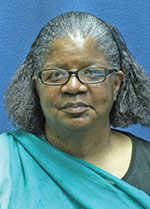Pastoral Ministry / Pearlette Springer
The issues of race, religion and politics in our Church
 “I am black and beautiful, daughters of Jerusalem. … Do not stare at me because I am so black, because the sun has burned me” (Sg 1:5-6).
“I am black and beautiful, daughters of Jerusalem. … Do not stare at me because I am so black, because the sun has burned me” (Sg 1:5-6).
For the past two, three, four years, we have been reminded by the media that we live in a divided country. We are divided along the lines of political parties, divided along racial identity, divided along religious piety and action—politics, race and religion.
I think we unconsciously foster the false impression that if we continue to ignore it, it will go away. So, we wait for the division along the lines of religion, race, and politics to disappear.
If we examine closely, I believe, these topics speak to the core of our existence, the core of our spiritual life, the core of our physical life, the core of our emotional and psychological life.
The Gospel of Mathew is very clear: “For where two or three are gathered together in my name, there am I in the midst of them” (Mt 18:20). God is our core. Therefore, when we gather to discuss the topics related to the core of our existence, it brings us closer to knowing, as Sister Thea Bowman, the first African American member of the Franciscan Sisters of Perpetual Adoration, said, “who we are and whose we are.” It brings us closer to knowing God, loving God, and serving God and God’s people.
As we use it, the term “race” describes people based on skin color and the origins of their ancestors. It is a social construct with no scientific backing. In other words, the term race as it relates to human beings was created by humans based solely on physical characteristics. However, some evidence points to the building of this construct as a declaration of the intellectual greatness of people of European descent versus those from the continents of Asia and Africa—and the unknown Indigenous people found in the Americas.
In their 2018 pastoral letter on racism, “Open Wide our Hearts: The Enduring Call to Love,” the U.S. bishops state that, “Consciously or subconsciously, this attitude of superiority can be seen in how certain groups of people are vilified, called criminals, or are perceived as being unable to contribute to society, even unworthy of its benefits.”
This racial classification is one of the structural and systemic foundations that keeps racism alive in our country. Racism is a dance, a dance between superiority and inferiority.
As a Black Catholic whose ancestry traces through the horrific chattel and slave trade of this country, I know that our survival as a people was and continues to be intertwined with race, religion and politics. These topics, whether discussed in public or private settings, bring deep emotions to the surface, which only affirms my belief that they speak to the core of our existence.
Race and racism are painful issues to discuss.
What does this have to do with the Church?
The Catholic Church in the U.S. follows the same rules based on this unproven social construct. We divide ourselves among this same racial classification, including within some of our parishes. Even the windows, statues and other sacred items in our parishes reflect mostly European culture. This is the case even in parishes that have a racially diverse population.
So, my question is: how do we become more inclusive on all levels? How do we reflect—in our parishes, leadership, liturgies, catechesis—the universal Church? I agree with the U.S. bishops, who in their pastoral letter on racism, state that “What is needed, and what we are calling for, is a genuine conversion of heart, a conversion that will compel change, and the reform of our institutions and society.”
I’m thinking … if we are truly the universal Church, we need to talk on topics that speak to the core of our existence. We need to learn how to talk about race, religion and politics.
(Pearlette Springer is the coordinator of Black Catholic Ministry in the archdiocese. She can be reached at pspringer@archindy.org. To read “Open Wide our Hearts: The Enduring Call to Love,” the bishops’ pastoral letter on racism, go to cutt.ly/OpenWideOurHearts.) †
 “I am black and beautiful, daughters of Jerusalem. … Do not stare at me because I am so black, because the sun has burned me” (Sg 1:5-6).
“I am black and beautiful, daughters of Jerusalem. … Do not stare at me because I am so black, because the sun has burned me” (Sg 1:5-6).